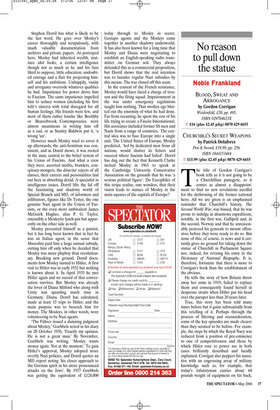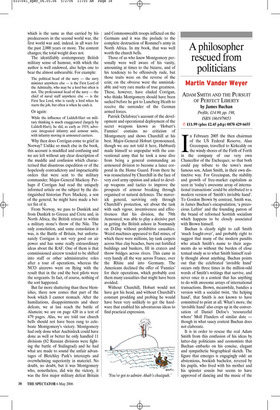No reason to pull down the statue
Noble Frankland
BLOOD, SWEAT AND ARROGANCE by Gordon Corrigan Weidenfeld, £20, pp. 495, ISBN 029784623X V £16 (plus £2.45 p&p) 0870 429 6655 CHURCHILL’S SECRET WEAPONS by Patrick Delaforce Pen & Sword, £19.99, pp. 256, ISBN 1844153444 V £15.99 (plus £2.45 p&p) 0870 429 6655 The title of Gordon Corrigan’s book tells us it is not going to be a Churchillian panegyric, so it comes as almost a disappointment to find no new revelations needful for the dethroning of the former national hero. All we are given is an emphasised reminder that Churchill’s history, The Second World War, was biased, that he was prone to indulge in disastrous expeditions, notably, in the first war, Gallipoli and, in the second, Norway and that he unreasonably pestered his generals to mount offensives before they were ready to do so. But none of this, of course, is news and it certainly gives no ground for taking down the statue of Churchill in Parliament Square nor, indeed, for revising his entry in the Dictionary of National Biography. It is, therefore, fortunate that there is more to Corrigan’s book than the establishment of the obvious.
He tells the story of how Britain threw away her arms in 1919, failed to replace them and consequently found herself in desperate straits when Hitler put his head over the parapet less than 20 years later.
True, this story has been told many times before but it gains substantially from this retelling of it. Perhaps through the process of filtering and reconsideration, some of the key episodes are made clearer than they seemed to be before. For example, the steps by which the Royal Navy was reduced from a position of pre-eminence to one of competitiveness and those by which Hitler rose to power are in both cases brilliantly described and lucidly explained. Corrigan also peppers his narrative with an engrossing array of military knowledge such as, for example, that today’s infantryman carries about 60 pounds weight of equipment on his back, which is the same as that carried by his predecessors in the second world war, the first world war and, indeed, in all wars for the past 2,000 years or more. The content changes; the total weight does not.
The identifiably contemporary British military sense of humour, with which the author is well endowed, also helps one to bear the almost unbearable. For example:
The political head of the navy — the navy minister anywhere else — is the First Lord of the Admiralty, who may be a lord but often is not. The professional head of the navy — the chief of naval staff anywhere else — is the First Sea Lord, who is rarely a lord when he starts the job, but often is when he ends it.
Or again:
While the influence of Liddell-Hart on mili tary thinking is much exaggerated (largely by Liddell-Hart), he did, as early as 1919, advo cate integrated infantry and armour units, with infantry moving in armoured carriers.
Why then does Corrigan come to grief in Norway? Unlike so much else in the book, this account is muddled and confusing and we are left without any clear description of the muddle and confusion which characterised that disastrous expedition or of the hopelessly contradictory and impracticable orders that were sent to the military commander, Major-General Mackesy. Perhaps if Corrigan had read the uniquely informed article on the subject by the distinguished historian Piers Mackesy, a son of the general, he might have made a better fist of it.
From Norway, we pass to Dunkirk and from Dunkirk to Greece and Crete and, in North Africa, the British retreat to within a military stone’s throw of the Nile. The only consolation, and some consolation it was, is the Battle of Britain, but unfortunately Corrigan is not very good on air power and has some really extraordinary ideas about the RAF. One of them is that commissioned aircrew tended to be shifted into staff or other administrative roles after a tour of operations, whereas the NCO aircrews went on flying with the result that in the end the best pilots were the sergeants. In fact, of course, nothing of the sort happened.
But far more shattering than these blemishes, there now comes that part of the book which I cannot stomach. After the humiliations, disappointments and sheer defeats, we at last reach the battle of Alamein; we are on page 420 in a text of 479 pages. Alas, we are told our church bells should not have been rung to celebrate Montgomery’s victory. Montgomery had only done what Auchinleck could have done as well or better he only handled 11 divisions (82 Russian divisions were fighting the battle of Stalingrad) and he had what are made to sound the unfair advantages of Bletchley Park’s intercepts and overwhelming superiority in materiel. No doubt, no doubt, but it was Montgomery who, nonetheless, did win the victory, it was the first major military defeat Britain and Commonwealth troops inflicted on the Germans and it was the prelude to the complete destruction of Rommel’s army in North Africa. In my book, that was well worth the church bells.
Those of us who knew Montgomery personally were well aware of his vanity, amounting at times to the bizarre, and of his tendency to be offensively rude, but those traits were on the reverse of the coin; on the obverse were the unmistakable and very rare marks of true greatness. These, however, have eluded Corrigan, who thinks Montgomery should have been sacked before he got to Luneberg Heath to receive the surrender of the German armed forces.
Patrick Delaforce’s account of the development and operational deployment of the secret weapons known as ‘Hobart’s Funnies’ contains no criticism of Montgomery and shows Churchill at his best. Major-General Hobart (pronounced, though we are not told it here, Hubbard) made himself so unpopular with the conventional army that he took a nose dive from being a general commanding an armoured division to become a lance corporal in the Home Guard. From there he was resuscitated by Churchill in the face of very cool army opinion and asked to develop weapons and tactics to improve the prospects of armour breaking through organised or natural defences. The maverick general, surviving only through Churchill’s protection, set about the task with such vigour, inventiveness and effectiveness that his division, the 79th Armoured, was able to play a decisive part in getting the British ashore in Normandy on D-Day without prohibitive casualties. Weird machines appeared to flail mines, of which there were millions, lay tank carpets across blue clay beaches, burn out fortified buildings and bunkers, fill in craters and throw bridges across rivers. This came in very handy all the way across France, over the Rhine and into Germany. The Americans declined the offer of ‘Funnies’ for their operations, which probably cost them many casualties that might have been avoided.
Without Churchill, Hobart would not have got his head, and without Churchill’s constant prodding and probing he would have been very unlikely to get the hardware that enabled his adventurous ideas to find practical expression.















































 Previous page
Previous page